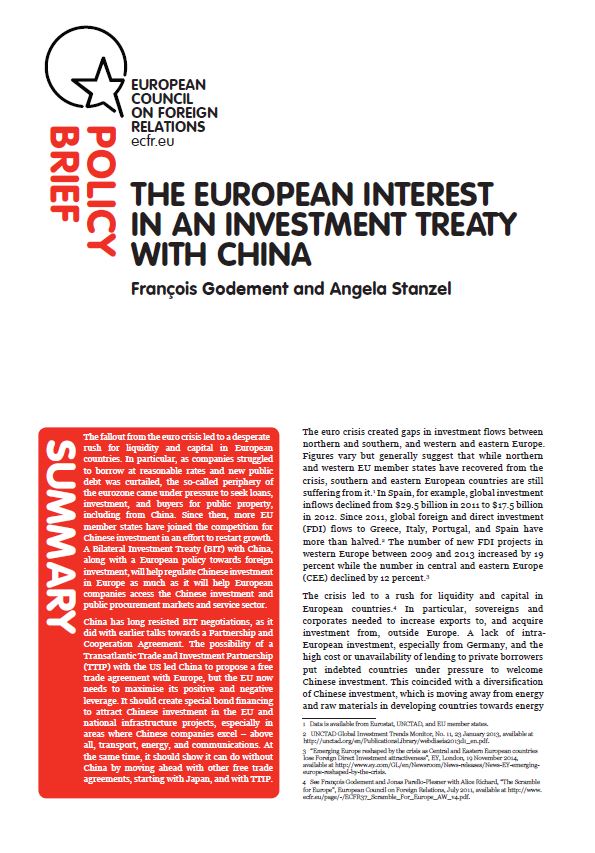The European interest in an investment treaty with China
In order to negotiate a meaningful treaty, Europeans need to unify around a negotiating mandate that reconciles their different interests
The euro crisis in 2010 led to a “Scramble for Europe” as indebted EU member states – especially in the so-called periphery – desperately sought investment, above all in their sovereign debt and infrastructure. But since then, the rush for Chinese investment has spread from the periphery to the core. The UK leads the race, and even France is now aiming for Chinese investment in its infrastructure – for example, in December 2014, the French government announced the sale of a 49.9 percent stake in the Toulouse airport to a Chinese consortium, with Lyon supposed to follow.
This makes it even more urgent for the EU to sign a Bilateral Investment Treaty (BIT) with China. China, which prefers to deal bilaterally with EU member states, was until recently reluctant to agree to such a treaty. However, the emergence of a series of mega-trade deals such as the Transatlantic Trade and Investment Partnership (TTIP) seems to have changed China’s mind. As China’s long-term “go-global” strategy shifts from resource producers to developed markets – and the renminbi gets stronger –China increasingly needs to invest in Europe.
“The European interest in an investment treaty with China” by Francois Godement and Angela Stanzel, explores what leverage Europeans have to negotiate the long wanted BIT with China.
The authors note that:
- The competition between member states directly affects the BIT negotiations, as it diminishes the EU’s leverage, and as China can play on bilateral relations whenever discussions at the EU level stall. Europe must now turn this disunity into a common negotiating position.
- The key priorities of the EU are to have investor-state dispute settlement mechanism in the BIT, and to improve the access European companies have to the Chinese market, which at present remains limited. In addition, the EU should prioritize transparency for capital flows and identity of investors in the BIT negotiations.
- The EU needs to maximise its leverage in the negotiations. The EU has positive leverage, such as special bond financing to attract Chinese investment in EU and national infrastructure projects. The EU should also use its negative leverage, and show it can do without China by moving ahead with other free trade agreements, starting with Japan, and with TTIP.
In the brief, they write:
“Like the EU, China is a global player. Trade and investment talks cannot be viewed in isolation of moves with third parties. Chinese economic agents – from SOEs turning into multilateral firms, to sovereign funds or more dispersed private actors – are in a decisive phase of capital internationalisation as China maintains a large current account surplus. China cannot sustain the past pattern of huge outlays in the right moment for European economy, while improving the direct access of European companies to the Chinese market.”
The European Council on Foreign Relations does not take collective positions. ECFR publications only represent the views of their individual authors.



